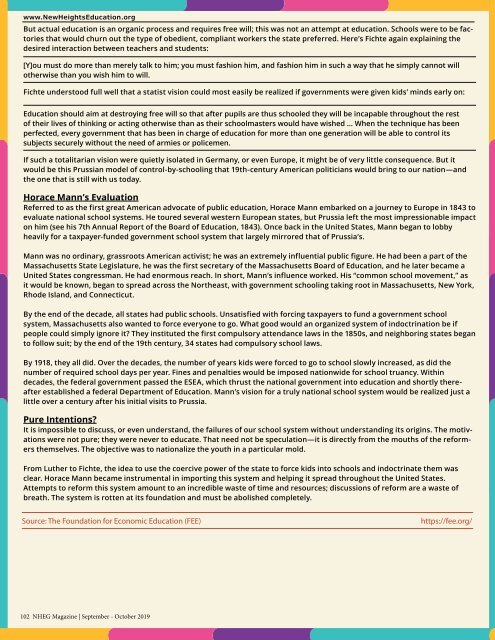NHEG-Magazine-September-October
You also want an ePaper? Increase the reach of your titles
YUMPU automatically turns print PDFs into web optimized ePapers that Google loves.
www.NewHeightsEducation.org<br />
But actual education is an organic process and requires free will; this was not an attempt at education. Schools were to be factories<br />
that would churn out the type of obedient, compliant workers the state preferred. Here’s Fichte again explaining the<br />
desired interaction between teachers and students:<br />
[Y]ou must do more than merely talk to him; you must fashion him, and fashion him in such a way that he simply cannot will<br />
otherwise than you wish him to will.<br />
www.NewHeightsEducation.org<br />
The National Society of High School Scholars -- NSHSS<br />
Fichte understood full well that a statist vision could most easily be realized if governments were given kids’ minds early on:<br />
Education should aim at destroying free will so that after pupils are thus schooled they will be incapable throughout the rest<br />
of their lives of thinking or acting otherwise than as their schoolmasters would have wished ... When the technique has been<br />
perfected, every government that has been in charge of education for more than one generation will be able to control its<br />
subjects securely without the need of armies or policemen.<br />
If such a totalitarian vision were quietly isolated in Germany, or even Europe, it might be of very little consequence. But it<br />
would be this Prussian model of control-by-schooling that 19th-century American politicians would bring to our nation—and<br />
the one that is still with us today.<br />
Horace Mann’s Evaluation<br />
Referred to as the first great American advocate of public education, Horace Mann embarked on a journey to Europe in 1843 to<br />
evaluate national school systems. He toured several western European states, but Prussia left the most impressionable impact<br />
on him (see his 7th Annual Report of the Board of Education, 1843). Once back in the United States, Mann began to lobby<br />
heavily for a taxpayer-funded government school system that largely mirrored that of Prussia’s.<br />
Mann was no ordinary, grassroots American activist; he was an extremely influential public figure. He had been a part of the<br />
Massachusetts State Legislature, he was the first secretary of the Massachusetts Board of Education, and he later became a<br />
United States congressman. He had enormous reach. In short, Mann’s influence worked. His “common school movement,” as<br />
it would be known, began to spread across the Northeast, with government schooling taking root in Massachusetts, New York,<br />
Rhode Island, and Connecticut.<br />
View Online National Society of High School Scholars<br />
Dear Pamela, On behalf of Mr. Nobel and the NSHSS team, we wish you<br />
and your family our warmest season's greetings.<br />
May your holidays and New Year be filled with joy.<br />
The end of the year is a time to look back with pride<br />
on all the wonderful things you have accomplished,<br />
and a time to look forward to goals for the New Year.<br />
May 2019 be your best year yet.<br />
Sincerely, James Lewis & the NSHSS Team<br />
By the end of the decade, all states had public schools. Unsatisfied with forcing taxpayers to fund a government school<br />
system, Massachusetts also wanted to force everyone to go. What good would an organized system of indoctrination be if<br />
people could simply ignore it? They instituted the first compulsory attendance laws in the 1850s, and neighboring states began<br />
to follow suit; by the end of the 19th century, 34 states had compulsory school laws.<br />
By 1918, they all did. Over the decades, the number of years kids were forced to go to school slowly increased, as did the<br />
number of required school days per year. Fines and penalties would be imposed nationwide for school truancy. Within<br />
decades, the federal government passed the ESEA, which thrust the national government into education and shortly thereafter<br />
established a federal Department of Education. Mann’s vision for a truly national school system would be realized just a<br />
little over a century after his initial visits to Prussia.<br />
Pure Intentions?<br />
It is impossible to discuss, or even understand, the failures of our school system without understanding its origins. The motivations<br />
were not pure; they were never to educate. That need not be speculation—it is directly from the mouths of the reformers<br />
themselves. The objective was to nationalize the youth in a particular mold.<br />
From Luther to Fichte, the idea to use the coercive power of the state to force kids into schools and indoctrinate them was<br />
clear. Horace Mann became instrumental in importing this system and helping it spread throughout the United States.<br />
Attempts to reform this system amount to an incredible waste of time and resources; discussions of reform are a waste of<br />
breath. The system is rotten at its foundation and must be abolished completely.<br />
Source: The Foundation for Economic Education (FEE)<br />
https://fee.org/<br />
102 102 <strong>NHEG</strong> | GENiUS <strong>Magazine</strong> MAGAZINE | <strong>September</strong> | www.geniusmag.com<br />
- <strong>October</strong> 2019<br />
<strong>September</strong> - <strong>October</strong> 2019 | <strong>NHEG</strong> <strong>Magazine</strong> 103


















